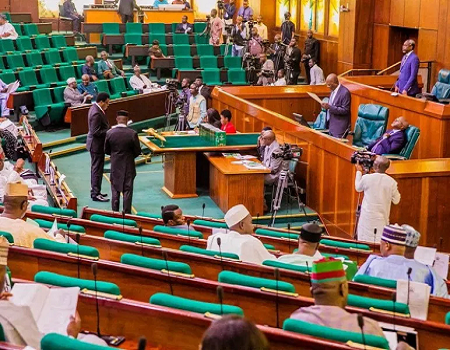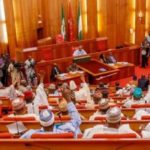Ongoing efforts by the Federal Government to improve the security of lives and property across the country gained a boost, on Tuesday, as the bill whichseeks to legalise ownership of firearms by Nigerians passed through Second Reading on the floor of the House of Representatives.
The private bill sponsored by Hon Adejoro Adeogun seeks to amend the Firearms Act, 2004, with a view provide for stricter requirements and legal framework for licensing of firearms ownership, proficiency training, storage, sale, assemblage and manufacturing of firearms in Nigeria.
In his lead debate, Hon Adeogun who called for stricter penalties in the proposed legislation observed that the firearms Act, 2004 was an adaptation of the 1959 Fire Arms Act put in place before Nigeria assumed political independence.
While stressing the need to make Nigeria a safer place for our constituents and all people who live and do business, he observed that: “At the time the 2004 Act was conceived the number of illicit weapons in private hands were still limited and level of insecurity relatively low in Nigeria. Given prevailing security challenges, 2004 is no longer robust enough to address contemporary weapons control challenges.
“The bill before us proposes the alteration of sixteen sections of the Fire Arms Act Cap F. 28 LFN 2004, to insert new clauses intended to strengthen the Act and provide for the proper regulation of licenses, ownership, proficiency training, handling, usage, storage, repairs, manufacture and sale of firearms in Nigeria.”
According to him, the proposed amendment seeks to ensure stricter control by raising the qualifying age from seventeen to eighteen years; introduce additional licensing requirements including a psychological evaluation certificate from a government hospital, not more than six months, vision quality certificate from a government hospital, not more than six months, Police clearance certificate not more than twelve months, rifle club membership of at least six months and a firearms proficiency certificate issued by the club and National Identification Number issued by the National Identity Management Commission (NIMC).
“Four days ago, two Nigerians were arrested in Niger State by the Nigeria Customs service while attempting to smuggle two hundred thousand rounds of special-purpose cartridges designed for use in multi loading-pump action rifles, into Nigeria. But for the patriotism and vigilance of the customs officers, the truckload of ammo would have found its way into our communities with the attendant escalation of the insecurity being faced across the country.
“Sadly, if these agents of death face charge today, they could be sentenced at the discretion of a trial judge to six months imprisonment or an option of paying N1,000 only. It is to address lapses such as the above that this bill seeks to amend Sections 28, 29,30, 31, 32, 35 and 38 to introduce stricter penalties for contravention of the Act.
While expressing support for local production of light weapons in the country, Hon Adeogun eaker, a couple of weeks ago, the Spokesman of the Nigeria Police led the parade of some suspects who were arrested for illicit manufacturing of AK 47 rifles.
“The spokesman emphasized that the locally fabricated weapons were as effective as the original ones imported from Russia. When this situation is juxtaposed with the perennial complaint of our troops in the North East about inadequate weaponry, one is forced to ask why we have failed to mainstream domestic production of weapons to address the shortfall of weaponry among the security and law enforcement agencies. The issue is that the existing Fire Arms Act does not allow for local production of firearms and light weapons by the private sector. In other words, the Nigerian business community is not allowed by law to participate in an industrial sector that grosses over $20 billion annually.
“How can we promote innovation if we shut our people away from this sector? Should we continue to do that in the face of our economic challenges? I have proposed an amendment of Sections 9 and 22 of the Act to provide for registration and licensing of businesses for the purpose of manufacturing, assembling, sale and training of licensees of firearms.
“By denying Nigerians the right to manufacture weapons we have inadvertently made our country dependent on other nations whose permission we must seek before we can obtain the tools needed by our security forces to combat security challenges.
“I am aware that some Nigerians would argue against local production of firearms on the ground that it would further enable the proliferation of weapons. Mr Speaker, the ease with wish people smuggle illicit weapons to our country has shown that criminally minded people will do everything possible to get the tools of their trade, hence denying our nation the economic benefits of local production, as well as the inherent advancement in that sector, is not the answer to the control of illicit weapons. We will be better off as a nation if (military-backed) local businesses are allowed to meet the needs of our security forces through the local production of light weapons.
“The major challenge faced by our nation today is insecurity. This bill is another step towards tightening loose ends, closing windows that were hitherto being exploited by criminals to possess illicit weapons whilst also exploring avenues for economic and technological advancement of the nation in an area that is of critical need,” he said.
YOU SHOULD NOT MISS THESE HEADLINES FROM NIGERIAN TRIBUNE
No Evidence Arab League Sent Warning Message To FG On Biafra Movement
CLAIM: A Twitter user claims that the Arab League of Nations sent a warning message to the Nigerian government on the Biafra movement.Reps pass bill on ownership of firearms through Second Reading.Reps pass bill on ownership of firearms through Second Reading
Reps pass bill on ownership of firearms through Second Reading
WATCH TOP VIDEOS FROM NIGERIAN TRIBUNE TV
- Let’s Talk About SELF-AWARENESS
- Is Your Confidence Mistaken for Pride? Let’s talk about it
- Is Etiquette About Perfection…Or Just Not Being Rude?
- Top Psychologist Reveal 3 Signs You’re Struggling With Imposter Syndrome
- Do You Pick Up Work-Related Calls at Midnight or Never? Let’s Talk About Boundaries







